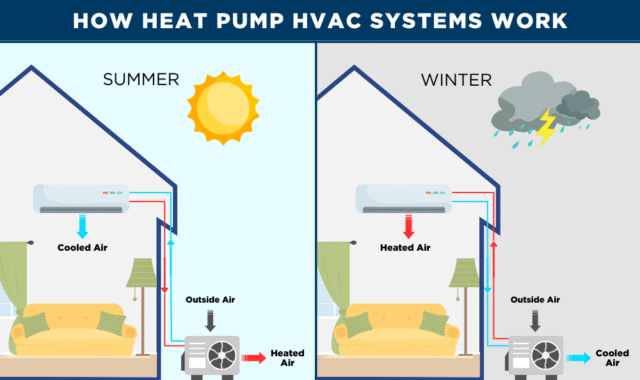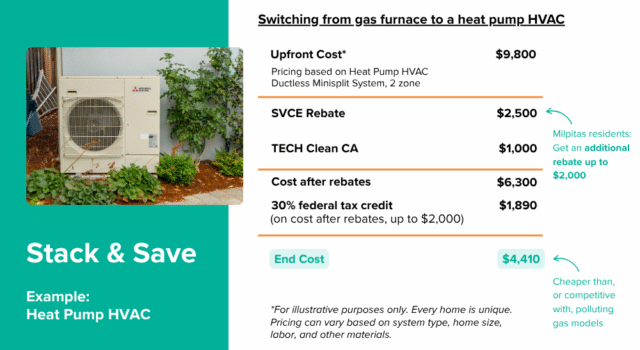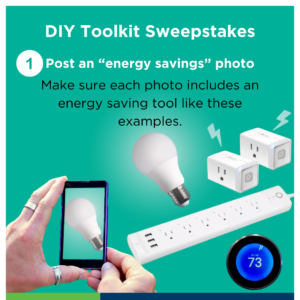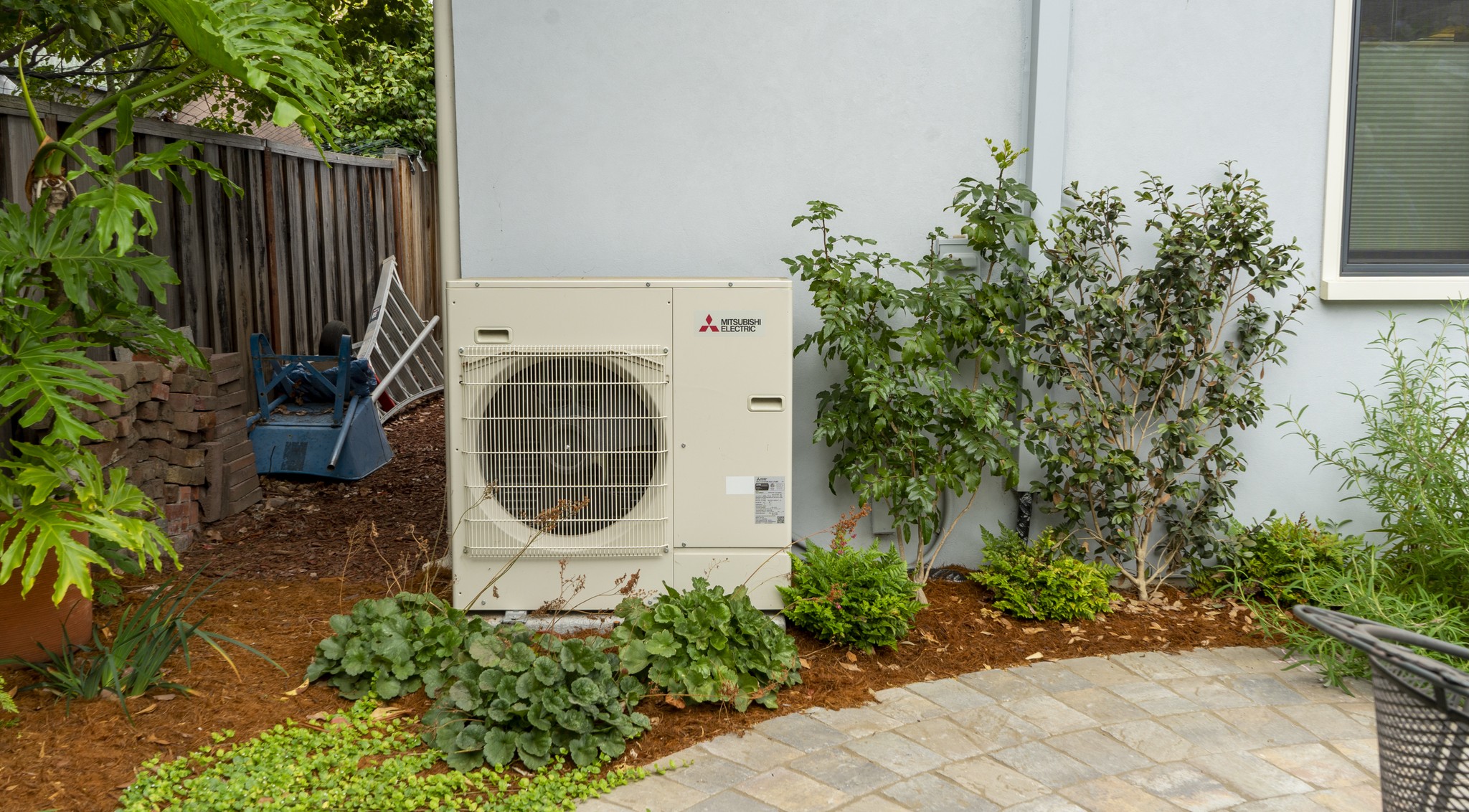
Heat Pump HVAC 101: A Comprehensive Guide for Silicon Valley Clean Energy Customers
If you rely heavily on your air conditioner (AC) or furnace and noticing higher bills, consider upgrading to an energy-efficient heat pump heating, ventilation, and air conditioning (HVAC) system. This solution is ideal if your gas furnace or air conditioning isn’t performing well, or if you’re planning to replace your current heater or air conditioner soon. A heat pump HVAC system efficiently cools your home during the hot months and heats it when chilly winter weather arrives, making it a versatile choice for year-round comfort.
Plus, Silicon Valley Clean Energy (SVCE) offers incentives for homeowners who switch to energy-efficient electric equipment, including both ductless and ducted heat pumps for heating and cooling, as well as heat pump water heaters. These incentives help cover the upfront costs, allowing you to invest in your home while benefitting the environment.
Why Consider a Heat Pump HVAC Over a Traditional Furnace or AC?
- Rebates and Tax Savings: With stackable rebates and tax credits, the installation costs of heat pumps are reduced, making them competitive with traditional gas heating and air conditioning systems.
- Energy Savings: According to RMI research, heat pumps range from 2.2 to 4.5 times more efficient than an EPA ENERGY STAR gas furnace on an annual basis. Plus, heat pumps can be scheduled to run during off-peak hours, maximizing savings with time-of-use rates.
- Carbon-reducing: Heat pumps run on the clean electricity Silicon Valley Clean Energy provides to your home and efficiently transfers heat rather than generating it, which cuts down greenhouse gas emissions homes otherwise produce when combusting a fossil fuel for heating.
- Consistent Temperature & Comfort: Variable-speed motors provide gradual heating and cooling, ensuring consistent temperatures without sudden blasts of air or disruptive noises.
- Efficiency: Ductless mini-splits offer room-by-room comfort while avoiding up to 30% energy loss typical of ducted systems (DOE).
- Healthier and Safer: Heat pumps do not rely on gas, which is safer, as not having gas in the home reduces fire risk and carbon monoxide poisoning, particularly in a region prone to earthquakes.
What Is a Heat Pump HVAC System and How Does It Work?
A heat pump HVAC system uses electricity to transfer heat between indoor and outdoor environments, providing both heating and cooling in one unit. Here’s a closer look into how they operate:
- Heating Mode: In winter, the heat pump extracts heat from the outside air (even in cold temperatures) and transfers it indoors. This process involves a refrigerant that absorbs heat and moves it through the system.
- Cooling Mode: In summer, the process reverses. The heat pump removes heat from the indoor air and releases it outside, cooling the interior space.
What Types of Heat Pump HVAC Is Right for My Home?
Air source heat pumps are the most common type of heat pump, using outside air to either provide heat for your home in the winter or remove heat from your home in the summer.
- Ducted central systems: Ideal if you already have ductwork and is efficient for heating and cooling the whole home.
- Ductless mini splits: These systems don’t require ductwork and offer individual room temperature control, making them a great option for homes without ducts, as well as for room additions or accessory dwelling units (ADUs).
How Much Does Installation Cost and What are the Available Incentives?
Installation costs for heat pumps vary based on the system type and home size. DIY ductless mini-split heat pumps can cost between $1,000 – $4,000. A single-zone air source heat pump can range from $5,400-$8,500, while whole-home air source heat pumps can range from $17,000-$30,000, depending on square footage.
Incentives can make a big difference in project costs. From do-it-yourself to done-for-you, SVCE offers rebates and services you need to upgrade your home with high-efficiency electric appliances, including heat pumps. These can be stacked with other federal, state, and local incentives to reduce upfront costs and help you achieve long-term savings on energy bills.
Options for Upgrading to a Heat Pump HVAC System:
- Option 1: DIY or Contractor Installation. If you already have a contractor or prefer to install a heat pump water heater yourself, reserve your rebate and claim your reimbursement through the SVCE Home Rebates program.
- Option 2: Need help finding a contractor and getting quotes? Use the free SVCE Assisted Home Upgrades tool. This free service allows you to request project quotes from multiple contractors and apply for all eligible rebates with a single application—all in one convenient place.
By trading in your outdated heating and cooling system for a heat pump HVAC, you can get up to $3,500 cash back in the process. Be sure to explore your Home Upgrade options and connect with qualified contractors in your area to ensure a smooth installation process.
Get expert help from our dedicated Energy Advisors!
Discover the benefits of going electric, explore available incentives, and get personalized advice for your home or determining your future EV. Our team is here to help, free of charge, Monday-Friday, 9 a.m. – 5 p.m. PT (excluding holidays). Chat Now or call (833) 243-4235.

